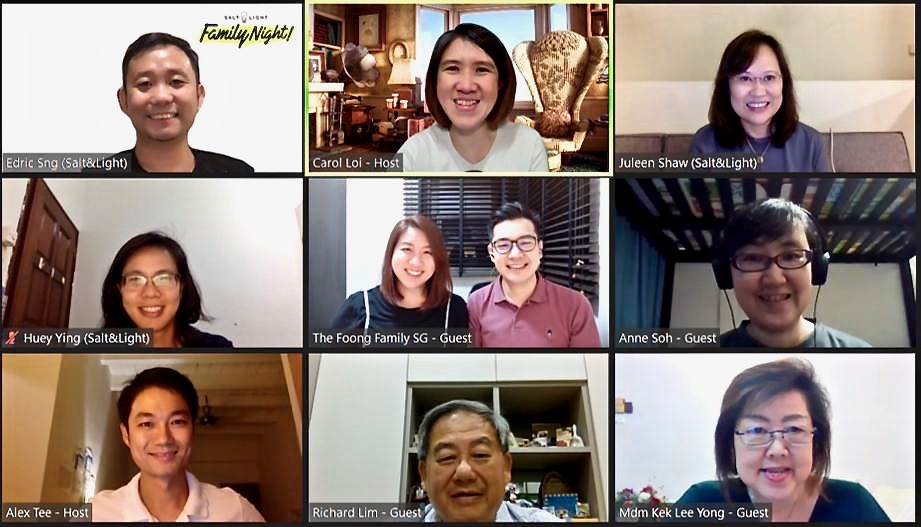“Who doesn’t want their child to blossom and excel?” Parents and principals get real about exam stress on Salt&Light Family Night
Christine Leow // August 20, 2020, 4:25 pm

Nearly 400 participants went on Salt&Light's Zoom chat show on August 18 to talk to principals and other parents about managing stress during this exam season.
It was a night where Salt&Light readers gained an understanding of the teen psyche (“teens are very much emo people”); parental anxiety (“when parents are stressed, we stress our children”), and honest sharing (“we need to really look at what it means for our child to blossom and excel”).
It’s the exam season and nearly 400 participants clicked on to join Salt&Light Family Night’s second Zoom chat show on August 18, to get tips on managing exam stress. On the panel were:
- Richard Lim, former principal of several primary schools including Henry Park Primary, Anglo-Chinese School (Primary) and Si Ling Primary;
- Tan-Kek Lee Yong, former principal and former Deputy Director, Psychological & Guidance Services Branch, Ministry of Education Headquarters;
- Elvin and Esther Foong, parents to two primary school-going children and founders of Christian resources website The Treasure Box Singapore;
- Anne Soh, former educator and parent to teen and young adult children.

(L-R) Former principals Tan-Kek Lee Yong and Richard Lim, and parents Elvin and Esther Foong, as well as Anne Soh, shared from their experience and their heart on ways to steer children towards a godly perspective of studies and success.
Here are some questions that were raised and addressed.
How do we manage school stress in our children?
Using the phrase “Stress Not”, Mr Lim came up with an easy way for parents to help their children manage academic stress:
ST – Strength of your child
RE – Relationship with your child
S – Serving and supporting your child
S – Set aside space for your child
NO – No entertainment for parents (so as not to distract the child)
T – Encourage your child to Take Breaks
“Ask God to give us a vision for each child.”
“ST stands for ‘strength’. Know what your children are good at, praise them and encourage them towards that,” he said. “In leadership training, we walk about this – spend 70% of the time on what we are good at in order to build our strengths.”
Ms Soh’s personal parenting experience bears this out. While her two older sons are academically inclined, her youngest daughter’s strengths lie in the arts.
She said: “We spend more time and energy helping her to groom those talents rather than say, ‘You have to get all A’s like your older brothers.’ We need to know each child.”
She added that she and her husband “ask God to give us a vision for each child – where is God taking them, what is their destiny? And we try and help them go on that path”.
With regards to “RE” (Relationship), Mr Lim said: “Build a relationship with your children or they won’t want to be around you. Children know whether you really care for them or not, and they will listen to you if you care.”
“It’s unrealistic to expect your child to concentrate for three hours.”
In serving and supporting your child (SS), Mr Lim encouraged parents to show love through acts of consideration, while Mrs Tan-Kek agreed: “Have a place set aside for them to study where they will not be distracted.”
Why does “NO” refer to “no entertainment for yourself”?
“When you watch your favourite show, it becomes a distraction for your child. You have to forgo this. Instead, you could pick up a book and read. This sets a good example for your children that you are learning, too,” encouraged Lim.
“T” is for taking a break. Mrs Tan-Kek pointed out: “It’s unrealistic to expect your child to concentrate for three hours. Factor in time for gadgets, for TV, or cycling. Their brains need a break.”
The panellists also talked about the importance of prayer. Mrs Tan-Kek learnt from her own mother to wake up early in the morning to pray for her children and students.
“Pray for God’s peace for your child,” added Mr Lim.
How do we motivate our children to be self-disciplined?
Cultivate a love for learning, encouraged Mr Lim.
“God has given us different gifts and talents. Stress comes from not knowing our child’s potential and worth, not knowing our child’s talents and gifts,” he said.
“The objective of exams is to give an idea of strengths and weaknesses, and not to judge and label.”
Added Ms Soh, who said not everything has to be about academics: “When it comes to my daughter’s passions – dance, art and music – she is so motivated.
“It may not be according to a mould society has for our children. But they may prosper in other ways. We need to know each child and where God is calling them.”
Relationships are motivational as well.
“Teens are very much emo people,” said Mrs Tan-Kek. “When they are happy with friends, they want to come to school and be engaged, and they will stay in class.”
The educators also said that a healthy perspective of school and exams can be motivational because the “objective of exams is meant to give an idea of strengths and weaknesses”. It is not to judge and label.
“When we study, we learn and grow. It is an act of worship.”
“But if we come across as judgemental and blaming, our children will just withdraw from us,”said Mrs Tan-Kek. “Constructive conversations with our children will stay with them for life and they will trust us even when they don’t do well.”
Mr Lim advocated building character to build self-discipline: “If we teach our children responsibility, diligence, hard work, initiative and attentiveness, don’t you think our children will do well in life?
“Then, you don’t need to be stressed about your child’s learning because your child will take the initiative.”
Ms Soh had an added perspective to share: “When we study, we learn and grow. It is an act of worship because we are finding out about God’s creation. Wanting to learn more about God through His creation is an act of worship.”
How do parents manage school stress?
Mum to two children aged seven and nine, Esther Foong shared how she manages school stress herself.
“If our children learn responsibility, diligence, hard work, initiative and attentiveness, don’t you think they will do well in life?
“Who doesn’t want their child to excel and blossom? But as parents, we need to look at what ‘excel and blossom’ means.”
She shared candidly about how she tries not to compare with other parents in the many parent chat groups she is a part of.
“The discipline is to say, ‘I’m not going to be affected. I’m not going to be tempted [to buy it] just because you said a certain assessment book is good’.
“Instead, I think, ‘Is this suitable for my child?’ We have to regulate ourselves when these conversations arise, and filter out what is suitable and what is not.”
How do we define success for children?
Ms Soh’s definition of success is to be aligned with God and for Him to say: “Well done, good and faithful servant.”
For the Foongs, their definition of success is tied to “doing your best”.
“Excellence is not an outcome; excellence is an attitude.”
Said Elvin Foong: “Excellence is not an outcome; excellence is an attitude.”
At a recent meeting with their children’s teachers, the Foongs – unlike other parents – did not ask about their children’s academic standing.
Instead, they asked three questions: Do they have a good attitude? Are they respectful? Do they have friends?
This prompted the teacher to ask the Foongs if they were Christians.
“To us, that was a validation of how we really want to parent our children,” said Mr Foong.
How do we accept being average?
This question brought on a smile to the Foongs, who quipped: “Is average a bad thing?”
“As human beings, we desire empathy from the people around us. Empathy is something that moves us, motivates us and causes us to want to be better.
“(Christ) knows what it’s like to go through what we go through and He has grace for us.”
“But a lot of time we don’t give that kind of empathy we ourselves desire to our children. We don’t tend to see our children as human beings going through life – probably in greater terror than we think they are – because of the stuff that is going on around them.
“Add to that the expectations that we have of them, their teachers have of them, society has of them. No wonder being average is scary and embarrassing. We can show more empathy to our children.”
This empathy is what God shows us, too, he noted.
“He knows what it’s like to go through what we go through, and He has grace for us.”
One way to deal with an inferiority complex is to “help our children find success in something they are good at”, added Mr Lim.
“This is where we can build our children’s self-esteem.”
In Ms Soh’s family, they celebrate effort rather than results.
Her children get taken to a nice meal after exams or even during the exam period, instead of when results are produced.
How do we help a child whose self-esteem has been bruised by peers or teachers?
Mrs Tan-Kek said symptoms of a bruised self-esteem include a tendency to maximise personal flaws while minimising strengths, being sensitive to criticism and even compliments, not maintaining eye contact and blaming others for bad situations.
“There is a free ‘helpline’ to God and He always answers us.”
“A way to bring healing is to affirm their actions. This goes some way to help them discover some of their positive [traits],” she said.
For children battling notions of inferiority, “love them unconditionally”, added Ms Soh. “The world will measure our kids with their standards. When our kids are home, it’s a safe place where we can continue to shower love on them regardless of what they have done and not done, just as God loves us.
“We don’t have to prove ourselves to earn His love.”
In closing, Mrs Foong had a word of encouragement for all parents: “God told me, ‘I’ve given you a 24/7 helpline’.
“If we don’t know how to handle a product, we often call a helpline. When we have a problem, we tend to go to someone of experience or we go to Google, or to our many WhatsApp groups.
“But God assures us, ‘I created your child.’ We have access to the source and creator of our children. There is a free ‘helpline’ to God and He always answers us.”
SALT&LIGHT FAMILY NIGHT: HOW CAN WE STRENGTHEN THE STATE OF THE FAMLY?
“Materially rich, but relationally poor”
That was what founder of Dad’s for Life Jason Wong observed about families in the second segment of Day of His Power 2020. The facts are there – increases in domestic violence during the Circuit Breaker and record rates of divorce.
Our “hearts are turned away from each another” resulting in “orphan spirits” that are distrustful in relationships. So, how can we heal the ophan spirit and mend our broken families? How can we strengthen the state of the family?
Hosts and family champions Carol Loi and Alex Tee will be joined by a panel of family advocates to talk about this:
- Pastor Ian Toh, Senior Pastor of 3:16 Church
- Jason Wong, Chairman of Focus on the Family Singapore & Founder of Dads for Life
- Raphael Zhang, Family Specialist at Focus on the Family
- Joanna Koh-Hoe, CEO of Focus on the Family
Come and learn together how our families can become stronger.
Date: Tuesday, September 1, 2020
Time: 8.30pm – 10pm
Cost: Free
Register at: https://bit.ly/SLFamilyNight1Sep
We are an independent, non-profit organisation that relies on the generosity of our readers, such as yourself, to continue serving the kingdom. Every dollar donated goes directly back into our editorial coverage.
Would you consider partnering with us in our kingdom work by supporting us financially, either as a one-off donation, or a recurring pledge?
Support Salt&Light




